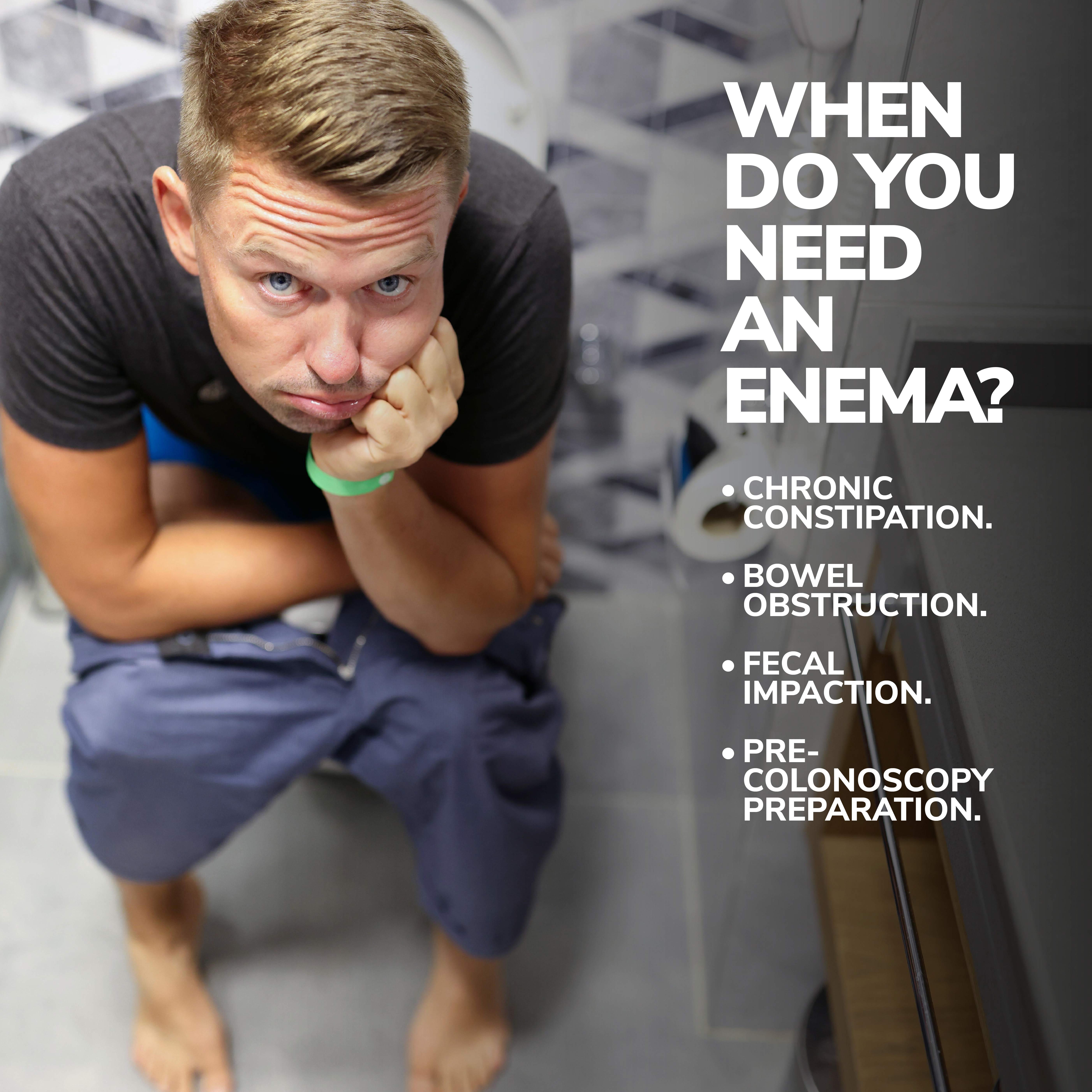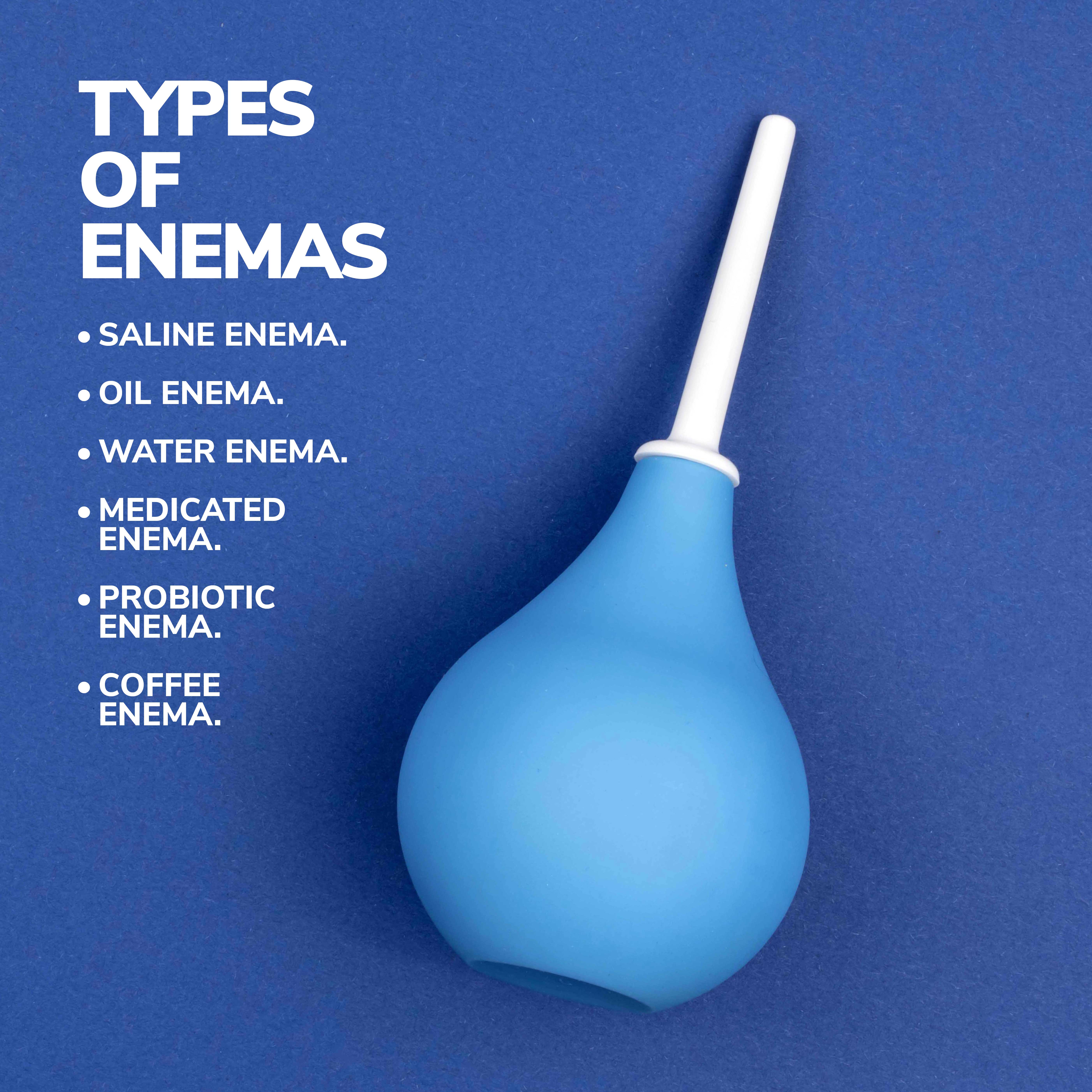
Should You Get an Enema?
An enema is a procedure in which a liquid, often a saline solution, water, or other substance, is introduced into the rectum and colon to help soften the stool, promote bowel movements, or cleanse the lower part of the gastrointestinal tract. This is done using a specialized device, such as an enema bag or bulb syringe, with a nozzle or tube gently inserted into the rectum. An enema might be right for you if you have been experiencing consistent gastrointestinal issues.
When Do You Need an Enema?
An enema may be recommended if you are experiencing one or more of the following symptoms:
- Chronic constipation: Infrequent bowel movements or difficulty passing stool for an extended period. Chronic constipation can lead to discomfort, bloating, and abdominal pain. Sometimes, it can result in hemorrhoids or anal fissures due to straining during bowel movements.
- Bowel obstruction: A blockage in the intestine that prevents the standard passage of waste. Various factors, such as tumors, scar tissue, or intestine twisting, can cause this. Bowel obstruction can lead to severe abdominal pain, vomiting, and distension.
- Fecal impaction: A hard stool mass lodged in the rectum, making it difficult or impossible to pass. If left untreated, this condition often results from chronic constipation, leading to severe abdominal pain, rectal bleeding, and even bowel perforation.
- Pre-colonoscopy preparation: Clearing the colon of waste to ensure optimal visualization during the procedure. A clean colon is essential for accurate screening and diagnosis of any abnormalities or potential cancerous growths.

Diagnosing the Symptoms
If you are experiencing any of the symptoms mentioned above, it’s crucial to consult a gastroenterologist for an accurate diagnosis. They will evaluate your symptoms and medical history and may perform a physical examination. This can involve checking for signs of abdominal tenderness, distension, or masses.
In some cases, additional diagnostic tests may be recommended to determine the root cause of your symptoms and rule out other underlying conditions. These tests can include:
- Blood tests: Blood tests can help evaluate anemia, inflammation, and infection. Anemia is characterized by a lower-than-normal number of red blood cells or low hemoglobin levels responsible for carrying oxygen throughout the body.
- Imaging studies: X-rays, CT scans, or MRIs can help visualize the abdomen and detect any blockages or abnormalities in the gastrointestinal tract.
- Endoscopy: A procedure that involves inserting a flexible tube with a camera through the mouth or anus to examine the digestive tract. This can help diagnose conditions such as Crohn’s disease, ulcerative colitis, or gastrointestinal bleeding.
- Colonoscopy: Performed by a gastroenterologist or colorectal surgeon, a colonoscopy uses a flexible, camera-equipped tube called a colonoscope to visualize the interior of the colon and rectum. Besides detecting and preventing colorectal cancer, a colonoscopy helps diagnose and manage various gastrointestinal disorders, such as inflammatory bowel disease and diverticular disease.
Types of Enemas
After a thorough evaluation and diagnosis, your gastroenterologist may recommend an enema as part of your treatment plan. There are different types of enemas, and the most appropriate option for you will depend on your specific situation:
- Saline enema: A mixture of salt and water softens the stool and promotes bowel movements. This type of enema is generally considered safe and effective for most people, as it mimics the body’s natural electrolyte balance. This is the most commonly used type of enema.
- Oil enema: Mineral, olive, or coconut oil lubricates and softens hard stools. This can be particularly helpful for individuals with fecal impaction, as it helps to break up the hardened mass and ease its passage.
- Water enema: Warm water cleanses the colon and stimulates bowel movements. This type of enema is often used for pre-colonoscopy preparation or to relieve mild constipation.
- Medicated enema: Containing medications to help treat inflammation, such as in cases of inflammatory bowel disease. These enemas may include corticosteroids or mesalamine, which can help reduce inflammation in the colon and rectum.
- Probiotic enema: A probiotic enema is a therapeutic intervention that introduces beneficial bacteria into the colon to help restore gut microbiome balance. The gut microbiome plays a critical role in digestion, nutrient absorption, and immune function, and an imbalance can contribute to digestive issues and inflammatory bowel diseases. Probiotic enemas are believed to potentially ease the symptoms related to digestive disorders and support immune function by delivering live bacteria directly into the colon. But the efficacy of probiotic enemas is still a subject of ongoing research, and more large-scale clinical trials are needed to establish their effectiveness and optimal formulations for different health conditions.
- Coffee enema: A controversial treatment that involves introducing a mixture of coffee and water into the rectum. Proponents claim it helps detoxify the liver and improve overall health. Limited scientific evidence supports these claims, and coffee enemas can pose potential risks, such as electrolyte imbalance, rectal burns, or bowel perforation.

An enema is generally considered safe when administered correctly, but following your gastroenterologist’s guidelines is essential to avoid complications or injury. Remember that enemas are a short-term solution, and addressing the underlying cause of your symptoms is crucial for long-term relief. This may involve dietary changes, increased fiber intake, hydration, regular exercise, or medication to manage constipation or other gastrointestinal issues.
It’s also important to note that while enemas can provide temporary relief, overuse can lead to dependency and disrupt the colon’s normal function. It’s crucial to use enemas only as directed by your doctor and seek their guidance for the long-term management of your gastrointestinal health.
Maintaining Good Bowel Health
While enemas may be beneficial in certain situations, you can take several steps to maintain proper bowel function and potentially reduce the need for an enema. Some preventive measures include:
- Hydration: Drinking enough water throughout the day helps keep your stool soft and promotes regular bowel movements.
- High-fiber diet: Eat a fiber-rich diet of fruits, vegetables, whole grains, legumes, and nuts. Fiber adds bulk to the stool and can help prevent constipation. Reduce the consumption of foods and drinks that can contribute to constipation, such as processed foods, refined carbohydrates, excessive dairy products, and caffeine.
- Exercise: Physical activity can help stimulate bowel movements and support overall digestive health. Aim for at least 30 minutes of moderate exercise most days of the week.
- A regular bowel routine: Try to use the restroom at the same time every day, preferably after a meal, to establish a consistent bowel pattern. Ignoring the urge to have a bowel movement can lead to constipation, making it more difficult to pass stool later.
- Stress Management: Stress can negatively affect your digestive system. Incorporate stress-reduction techniques, such as deep breathing, meditation, or yoga, into your daily routine.
- Medication Management: Certain medications can cause constipation, such as opioids, iron supplements, and some antacids. Talk to your gastroenterologist provider if you suspect your medications might be contributing to constipation. They may be able to suggest alternative treatments or adjust dosages.

Contact Us
If you’re experiencing gastrointestinal issues and think an enema may be beneficial, contact Gastroenterology of Greater Orlando. Our team of experts is here to help diagnose and treat your condition with the utmost care and expertise. Our practice began more than 15 years ago and has emerged as one of the leading gastroenterology practices in central Florida. We perform a host of diagnostic procedures using state-of-the-art equipment in a friendly, comfortable, and inviting atmosphere where patient care is always a top priority. Contact us today!